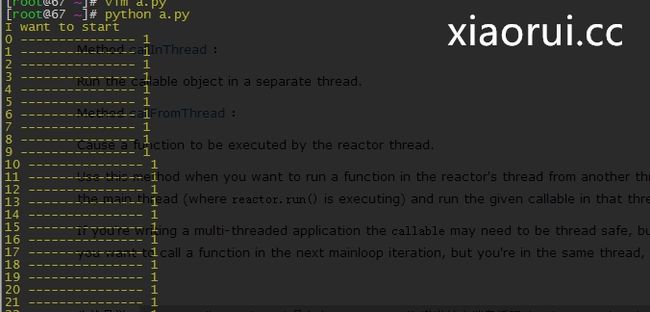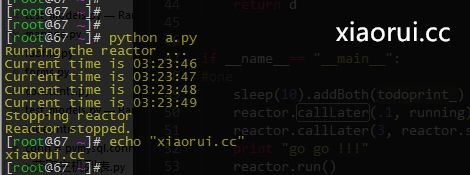twisted应用中异步回调的方式及线程的应用
前言:
学习了golang的goruntine后,再回过头来看twisted网络编程库中的异步应用,没事琢磨下,以前搞过一个twisted做负载分发,性能差的要命,这几天再搞搞,看看能不能做少许提升。
说正题:
先介绍下twisted的几个的概念
twisted有个defer的概念,说来golang也有个defer,只是golang的是和panic recover配合做异常捕获的。 twisted的defer是异步的一种变现方式,可以这么理解,他和thread的区别是,他是基于时间event的。
有了deferred,即可对任务的执行进行管理控制。防止程序的运行,由于等待某项任务的完成而陷入阻塞停滞,提高整体运行的效率。
Deferred能帮助你编写异步代码,但并不是为自动生成异步或无阻塞的代码!要想将一个同步函数编程异步函数,必须在函数中返回Deferred并正确注册回调。
事件的好处,有堵塞io的操作的时候,我把这个任务扔到后面执行,当io执行好了后,我再继续计算刚才那个事 .
callback链表有三个形式,正常结束,例外结束,任意状态,他们分别调用会调用 addCallback\addErrback\addBoth注册到链表中。 特意说下,addBoth是任何的状态也都会执行
这里再说下,twsited的线程。reactor.callFromThread 是由reactor.run 搞出来的,所以你做好状态用reactor.stop可以控制他的关闭,就是因为他是由reactor.run派出来的进程,所以会堵塞主任务线程的,然而reactor.callInThread是一个个的独立的线程,他不堵塞了,但是他也无法stop了。。。。
#coding=utf-8
from twisted.internet import reactor
#xiaorui.cc
import time
reactor.suggestThreadPoolSize(30)
def tt(i,j):
if i =="10":
reactor.stop()
while 1:
print i,'---------------',j
time.sleep(2)
def gg(i,j):
time.sleep(2)
if i ==10:
reactor.stop()
print i,'---------------',j
time.sleep(2)
for i in range(50):
# reactor.callFromThread(gg,i,i)
reactor.callInThread(tt,i,i)
print "I want to start"
reactor.run()
原文: http://rfyiamcool.blog.51cto.com/1030776/1386786
twisted自带了一个顺序执行的组件叫做 callLater, 我们可以规定第一秒执行这个函数,第二秒执行那个函数,第三秒的时候关闭realor ! 干脆点,你可以想成是计划任务。
from twisted.internet import reactor
import time
def printTime():
print 'Current time is',time.strftime("%H:%M:%S")
def stopReactor():
print "Stopping reactor"
reactor.stop()
reactor.callLater(1,printTime)
reactor.callLater(2,printTime)
reactor.callLater(3,printTime)
reactor.callLater(4,printTime)
reactor.callLater(5,stopReactor)
print 'Running the reactor ...'
reactor.run()
print 'Reactor stopped.'
下面的例子,你们自己跑跑,我上面说的都是一些个零散的例子,大家对照下面完整的,走一遍。 twisted理解其实却是有点麻烦,大家只要知道他是基于事件的后,慢慢理解就行了。
#coding:utf-8
#xiaorui.cc
from twisted.internet import reactor, defer
from twisted.internet.threads import deferToThread
import os,sys
from twisted.python import threadable; threadable.init(1)
deferred =deferToThread.__get__
import time
def todoprint_(result):
print result
def running():
"Prints a few dots on stdout while the reactor is running."
# sys.stdout.write("."); sys.stdout.flush()
print '.'
reactor.callLater(.1, running)
@deferred
def sleep(sec):
"A blocking function magically converted in a non-blocking one."
print 'start sleep %s'%sec
time.sleep(sec)
print '\nend sleep %s'%sec
return "ok"
def test(n,m):
print "fun test() is start"
m=m
vals = []
keys = []
for i in xrange(m):
vals.append(i)
keys.append('a%s'%i)
d = None
for i in xrange(n):
d = dict(zip(keys, vals))
print "fun test() is end"
return d
if __name__== "__main__":
#one
sleep(10).addBoth(todoprint_)
reactor.callLater(.1, running)
reactor.callLater(3, reactor.stop)
print "go go !!!"
reactor.run()
#two
aa=time.time()
de = defer.Deferred()
de.addCallback(test)
reactor.callInThread(de.callback,10000000,100 )
print time.time()-aa
print "我这里先做别的事情"
print de
print "go go end"
原文: http://rfyiamcool.blog.51cto.com/1030776/1386786
Twisted的回调是个麻烦事,我觉得node.js的异步回调也麻烦,去年的时候看了将近半个月的node,刚开始学的挺high,后期学到express的各种高性能回调,有点发蒙,最后因为别的事情也就暂时放弃了。 我相信不仅是我,而且大家应该还是喜欢golang和eventlet风格,用同步的形式写代码解决异步的事。

